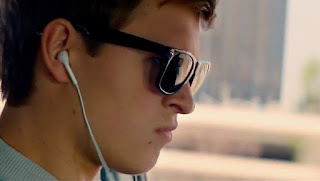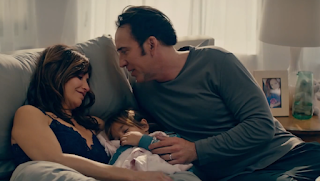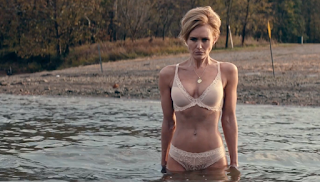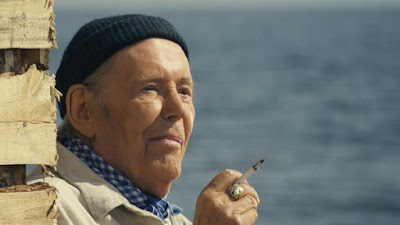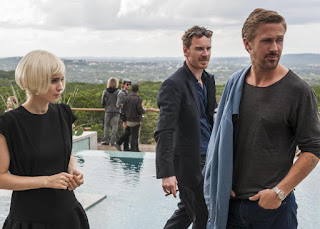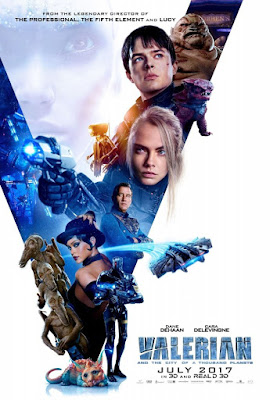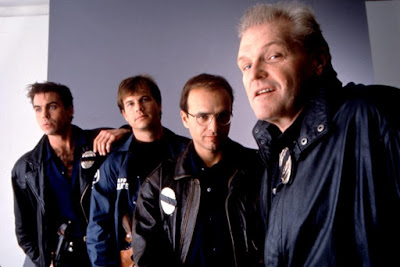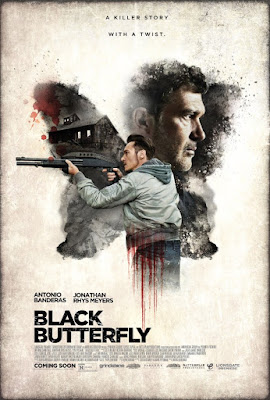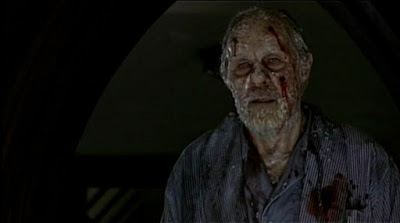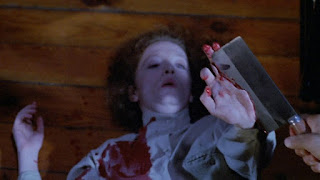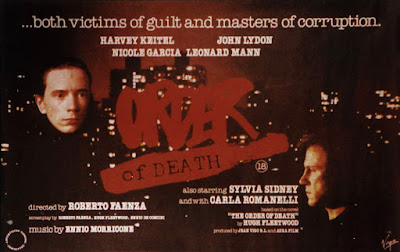BABY DRIVER
(US/UK - 2017)
Written and directed by Edgar Wright. Cast: Ansel Elgort, Kevin Spacey, Jamie Foxx, Jon Hamm, Lily James, Eiza Gonzalez, Jon Bernthal, CJ Jones, Flea, Paul Williams, Sky Ferreira, Lance Palmer, Clay Donahue Fontenot, Richard Marcos Taylor, Brogan Hall. (R, 112 mins)
There's a lot to parse with Edgar Wright's BABY DRIVER that should keep film critics, hardcore movie nerds, vinyl hipsters, and jaded music bloggers with dog-eared thesauri who haven't liked any music recorded after 1980 busy with overly analytical and diarrhetically verbose thinkpieces until Labor Day at the earliest, but before they take the fun out of everything, the short answer is yes, it's the most dynamic, exhilarating, and flat-out enjoyable big-screen experience of the summer thus far. Best known for his dead-on genre spoofs in his "Cornetto Trilogy" with Simon Pegg and Nick Frost (2004's SHAUN OF THE DEAD, 2007's HOT FUZZ, and 2013's THE WORLD'S END), Wright branched out with 2010's SCOTT PILGRIM VS. THE WORLD and was set to helm Marvel's ANT-MAN until creative differences sent him voluntarily packing during pre-production. THE WORLD'S END featured Wright's most multi-dimensional characterizations and demonstrated an all-around maturity and confidence as a filmmaker beyond a sense of smart, well-crafted homage, and BABY DRIVER is his most assured and ambitious statement yet. He's still making a loving homage to his DVD and Blu-ray collection, but infuses it with a manic, propulsive energy that makes BABY DRIVER a virtuoso display of cinematic mash-ups that uses its soundtrack as part of the action. When Focus' classic rock radio staple "Hocus Pocus" plays during a car chase and subsequent shootout, the gun blasts are in perfect sync with the riffs. When Jon Spencer Blues Explosion's "Bellbottoms" introduces title wheelman Baby (a star-making performance from Ansel Elgort from the pointless CARRIE remake and THE FAULT IN OUR STARS), it's timed to his own moves waiting for the crew he's driving as they're robbing a bank. When Bob & Earl's "Harlem Shuffle" plays as Baby walks down the street and around the corner on a coffee run, it becomes a production number of sorts as he dodges pedestrians and cars. There's the undeniable presence of wheelmen of heist films past constantly lurking over BABY DRIVER, whether it's 1978's THE DRIVER or 2011's DRIVE, but it's not a stretch to say that Wright's film has an infectious spirit that brings to mind LA LA LAND if directed by Walter Hill. It's the STREETS OF FIRE of its generation.
Adorned with earbuds and a fistful of iPods for different days and different moods, Baby is the regular wheelman for Atlanta criminal mastermind Doc (Kevin Spacey), who assembles a different crew for each job. The common denominator is Baby, who constantly plays music to drown out a lifelong case of tinnitus dating back to a childhood car accident that left him with a few facial scars and took the lives of both of his parents. Baby can maneuver his way out of any situation as long as he chooses the right playlist for the job ("Wait, stop...I gotta restart the song," he says after Doc's guys are delayed getting out of the car). He's working off a debt to Doc going back to a teenage incident where he stole his Mercedes, which enraged Doc but "the balls on this kid" earned the criminal's respect. After finishing his last job and wiping the slate clean, Baby is relieved that he's out and can care for his aging, deaf foster father Joseph (CJ Jones) and focus on a blossoming romance with shy diner waitress Debora (Lily James). Of course, Doc comes calling, demanding Baby's services even though the debt is paid off, but this time as a partner. The latest job is an elaborate yet foolhardy money order scam involving robbing a post office, a job for which Doc assembles a veritable supergroup of shitheads from jobs past: ex-Wall Street asshole and current junkie Buddy (Jon Hamm) and his ex-stripper girlfriend Darling (Eiza Gonzalez), and the menacing Bats (Jamie Foxx), an unstable psycho whose first response to anything is to start shooting.
Loaded with dynamite car chases and snappy, quotable dialogue ("This is Eddie No-Nose...formerly known as Eddie the Nose"), and tough guy repartee, BABY DRIVER is a big-screen mix tape where Wright uses the music as an integral part of the action, rather than just a meaningless soundtrack cue. Its characters are also fully developed with varying shades and unpredictable arcs. The biggest threats aren't who we think they are, and Wright isn't afraid to pull some surprises and give a big name an earlier-than-expected exit. Anything can happen at any time in BABY DRIVER, whether it's the ruthless Doc showing a little sympathy, Buddy not hesitating to turn on Baby, even after bonding with him over the mutual love of Queen's "Brighton Rock" from their 1975 album Sheer Heart Attack, or even a brief appearance by legendary songwriter and ubiquitous '70s pop culture figure Paul Williams as a feared gun dealer known as "The Butcher." Wright even turns Baby and Debora's laundromat date--accompanied by T.Rex's "Deborah"--into a visual feast with purposeful choreography, their movements around the washers accompanied by a colorful backdrop of a wall of dryers spinning like records. BABY DRIVER is candy for the eyes and ears, propelled by intense action, solid character turns by a cast of top-of-the-line pros in Spacey, Hamm, and Foxx, and at its core, the summer's most appealing couple in Elgort and James. The film's only stumble is that after 100 minutes of tightly-edited and perfectly-constructed control. Wright doesn't seem 100% sure of how to wrap it all up. It's a small hiccup that's hardly a deal-breaker, and it doesn't stop BABY DRIVER from being one of 2017's best and most entertaining films.

